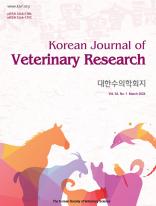- All manuscripts should be prepared according to the research and publication ethics guidelines recommended by the Council of Science Editors (http://www.councilscienceeditors.org/), the International Committee of Medical Journal Editors (ICMJE, http://www.icmje.org/), the World Association of Medical Editors (WAME, http://www.wame.org/), or the Korean Association of Medical Journal Editors (KAMJE, https://www.kamje.or.kr/en/main_en). The Korean J Vet Res will follow the guidelines of the Committee on Publication Ethics (COPE, http://publicationethics.org/) for settlement of any ethical issue or misconduct.
-
Research ethics: Animal experiments should be reviewed by an appropriate committee for the care and use of animals (i.e., an Institutional Animal Care and Use Committee; IACUC). Studies with pathogens requiring a high degree of biosafety should pass the review of a relevant committee (i.e., an Institutional Biosafety Committee; IBC). We encourage authors to adhere to animal research reporting standards, for example, the ARRIVE reporting guidelines (https://www.nc3rs.org.uk/arrive-guidelines) for reporting study design and statistical analysis; experimental procedures; experimental animals, and housing and husbandry practices. For studies using client-owned animals, authors should demonstrate a high standard (best practice) of veterinary care that includes obtaining informed client consent. Manuscripts will be rejected if the manuscript or author fails to meet the aforementioned requirements, and the study involved unnecessary pain, distress, suffering, or lasting harm to animals.
All studies involving human subjects or human data must be reviewed and approved by a responsible Institutional Review Board (IRB). Authors should follow the principles embodied in the Declaration of Helsinki (https://www.wma.net/policies-post/wma-declaration-of-helsinki-ethical-principles-for-medical-research-involving-human-subjects/) for all investigations involving human materials.
The approvals obtained for the above should be described in the manuscript’s Methods section. For studies of humans, including case reports, also state whether informed consents were obtained from the study participants. The Editor may request submission of copies of IACUC, IBC, or IRB approval documents and copies of informed consents from human subjects in clinical studies. -
Redundant publication and plagiarism: Redundant publication occurs when two or more papers, without full cross reference, share the same hypothesis, data, discussion points, or conclusions. Plagiarism ranges from the unreferenced use of others’ published and unpublished ideas, including research grant applications to submission under “new” authorship of a complete paper, sometimes in a different language. It may occur at any stage of planning, research, writing, or publication: it applies to print and electronic versions. The Korean J Vet Res will follow the COPE flow chart (http://publicationethics.org/) for settlement of any misconduct.
Authors should specify, in the cover letter, any potential overlap with other already published material or material being evaluated for publication and should also state that the submitted manuscript substantially differs from this other material. -
Authorship: The Korean J Vet Res follows the recommendations for authorship by the International Committee of Medical Journal Editors (ICMJE, 2010, http://www.icmje.org) and the Good Publication Practice Guidelines by the Korean Association of Medical Journal Editors (KAMJE, 2008, http://kamje.or.kr). The Uniform Requirements by the ICMJE recommends authorship as follows. “Authorship credit should be based on 1) substantial contributions to conception and design, acquisition of data, or analysis and interpretation of data; 2) drafting the article or revising it critically for important intellectual content; 3) final approval of the version to be published; and 4) agreement to be accountable for all aspects of the work in ensuring that the questions related to the accuracy or integrity of any part of the work are appropriately investigated and resolved. Authors should meet these 4 conditions. If any persons who do not meet the above four criteria, they may be placed as contributors in the Acknowledgments section.
Beyond the ICMJE recommendations, the KAMJE guidelines suggest that all authors should make a substantial intellectual contribution to the publication, the guidelines warn against authorship abuse, and list common types of abuse. Authorship is an important aspect of research publication, and all involved authors should agree whole contents of the document including authorship. Contributors should be differentiated from authors as recommended by the ICMJE. The Korean J Vet Res does not correct authorship after publication unless any mistake has been made by the editorial staff. Authorship may be changed before publication but after submission when an authorship correction is requested by all authors involved.
 |
 |
















